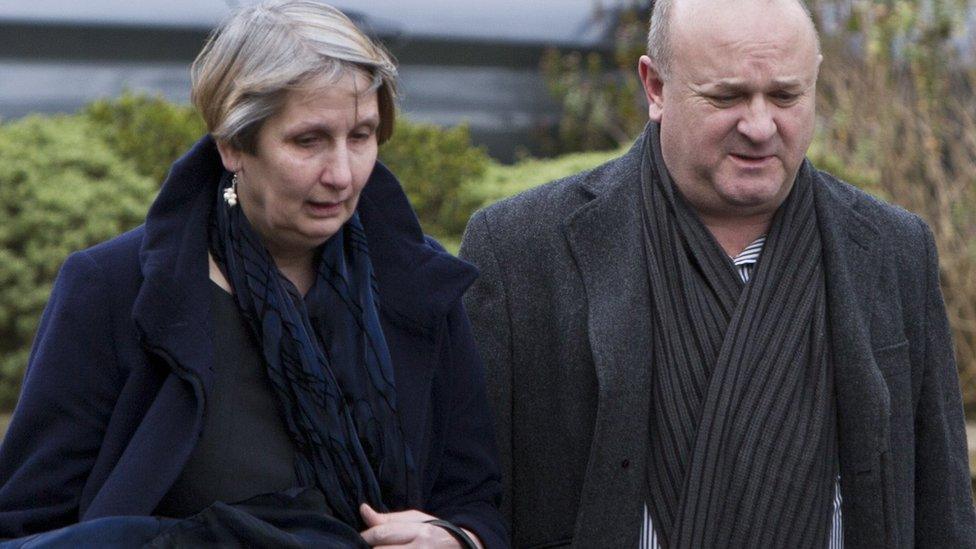Who was the Conservative activist Elliott Johnson?
- Published
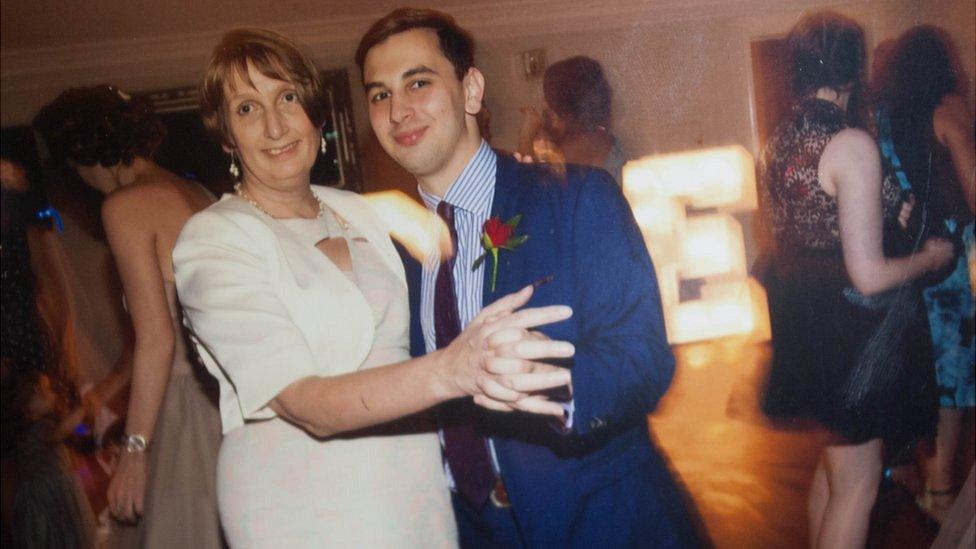
The last family photograph of Elliott Johnson was taken three days before his death. He was captured enjoying a dance with his mother Alison at a family wedding in Northamptonshire
The last family photograph of Elliott Johnson shows him dancing with his mother. Three days later he was dead. Who was Elliott and what happened in the 72 hours between those two events?
"I felt a bit odd," says Alison Johnson. "I could not concentrate on making the meal that night. I was stopping and starting, I did not feel myself."
At 16:05 BST on 15 September last year, Mrs Johnson took a break from the kitchen and called her son Elliott. There was no response.
We now know what Elliott was doing when she rang - he was arriving at the train station in Sandy, Bedfordshire, where he ended his life in front of an oncoming train.
Today an inquest found 21-year-old Conservative activist Elliott Johnson intended to kill himself.
Mr Johnson claimed he was the victim of bullying at the hands of Tory supporters. His family say the verdict will be the beginning of their efforts to find out what happened to him.
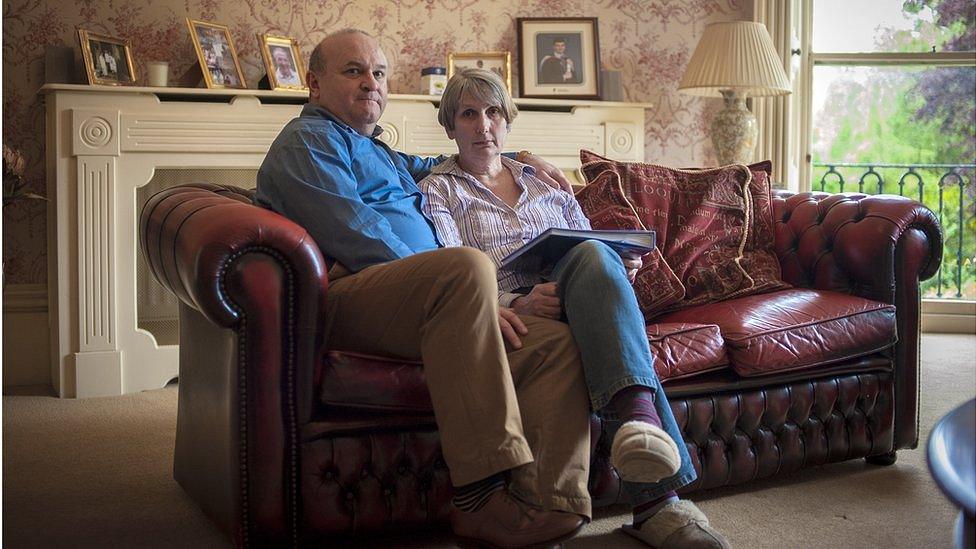
Ray and Alison Johnson at home in Wisbech. Elliott's graduation photograph sits behind them on the mantelpiece
The last conversation Elliott had with his father Ray was the morning after the family wedding in Corby.
Ray refused to pay the taxi fare because it was nearly two hours' late. He gave the driver a £5 tip and told him to get the taxi company to call him if they had an issue with his refusal to pay the fare.
Elliott, says Ray, backed him in his refusal to pay.
So when two police officers - one man, one woman - knocked on the door of the family's home in Wisbech just after 23:30 on 15 September 2015, Ray assumed it was to do with the unpaid taxi bill.
"We let them in," says Ray. "We did not know why they were here at that time of night and they told us there had been a body found on a railway line.
"Their description of Elliott, the way he was dressed, the fact he had his Union Jack wallet and other things... it was just a massive, massive shock.
"Three days earlier we had been at a family wedding. He was thoroughly enjoying himself - he was drinking, dancing and joining in with the fun."
The family have also tried to make sense of the manner of his death on a railway line. His mother says he could have killed himself by eating peanuts, so allergic was he to them.
"I think he wanted to make an enormous explosion to bring people down," says Ray.
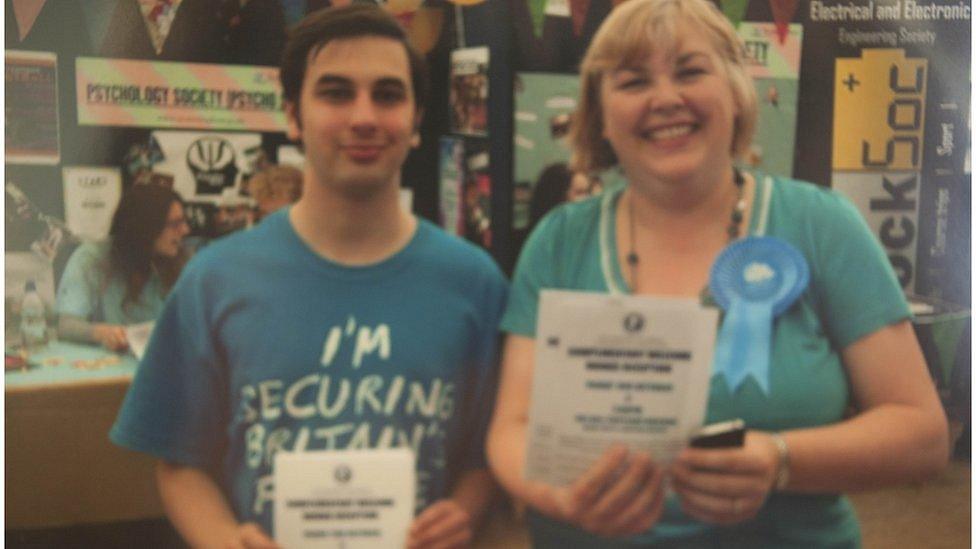
Elliott out on the election campaign trail with Conservative candidate Jane Hunt
"We knew he had an issue at work in London and he was looking for new employment.
"We knew he had an issue with a person, although Elliott brushed that aside, but what happened that night we just could not take it in.
"At the end, he felt he'd lost his job, he had been intimidated, he felt his career had been destroyed by Mark Clarke (Mr Clarke denies accusations of bullying) and he felt the losses of some of his friends.
"I think the culmination of all of this, to Elliott, was just such a savage blow that it rendered him in such a state of depression that he could not bring himself out of it.
"Three days earlier he was absolutely fine. What happened in those intervening days, we'll find out."
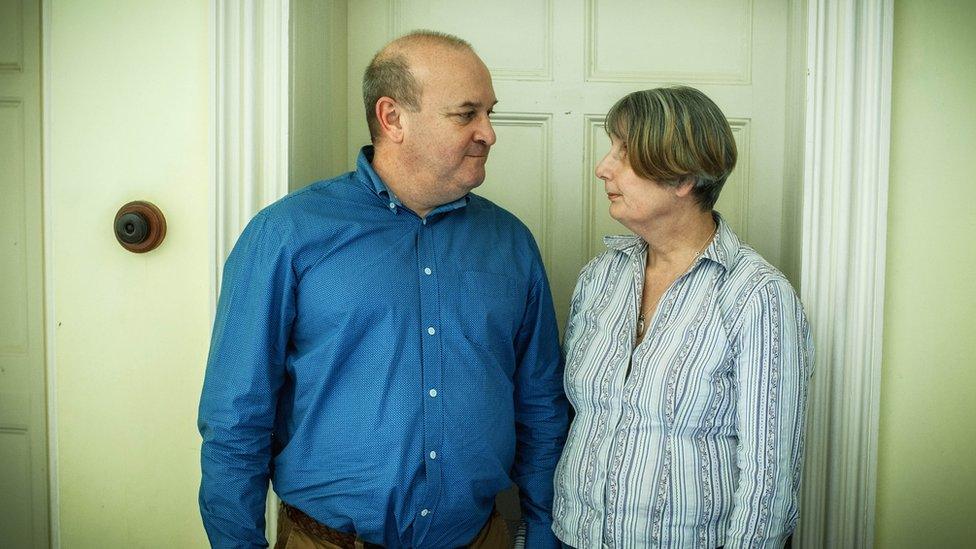
Ray and Alison Johnson stand outside Elliott's bedroom. Inside, their son's belongings remain as they were before his death
The picture of Elliott revealed by his parents is of a young man well adept at handling taunts, slights and bullies.
Always shorter in height than his contemporaries (he was 5ft 3in as an adult, and slight in build), what he lacked in physical presence he made up for with a quick wit and clever tongue.

The final months of Elliott Johnson's life
June 2015: He starts working for the campaign group Conservative Way Forward as political editor
12 August: Mr Johnson makes a complaint to the Conservative party about activist Mark Clarke (which he denies). Around the same time he is demoted because of budget cuts
5 September: He withdraws his complaint after a meeting with Mr Clarke
15 September: Mr Johnson is found dead on railway tracks near Sandy station, Bedfordshire
16 September: Police find a letter in his room accusing Mr Clarke, who denies allegations of bullying
18 November: Mr Clarke is expelled from the party
28 November: Grant Shapps resigns amid claims he failed to act on bullying complaints while co-party chairman

"He could speak at an early age," says Alison. "He told Ray's boss about an octopus at the age of two. He was taken aback."
"He was a very gregarious boy, even from an early age, he was a sponge - he had a thirst for knowledge," says Ray.
"He wouldn't be satisfied, he was always looking for something to learn. He wasn't the boy who would sit around doing nothing. Every minute had to be used.
"As soon as he could walk and talk, it was questions and the answers had to be detailed."
Born in Australia, Elliott's earliest interests were dinosaurs and history. Aged just three, he made a stegosaurus out of bits of iron stone found in the garden - then added a little white pebble to it as a baby dinosaur.
Exactly when his passion for politics started is unclear. It may have been when, aged 10, his family moved to Wisbech and the local authority decided he and his younger sisters Charlotte and Harriet would all have to go to different primary schools.
A Conservative county councillor supported Ray and Alison's ultimately successful appeal against the decision. This, his parents admit, may have left a positive Conservative imprint in the mind of the young Elliott.
But a young Elliott was furious when he approached the then North East Cambridgeshire MP Malcolm Moss (Con) to talk through issues of interest. The 10-year-old felt the MP - whom he had previously met at a function hosted at his parents' home - had not taken him seriously.
"He was not happy about that," says Ray.
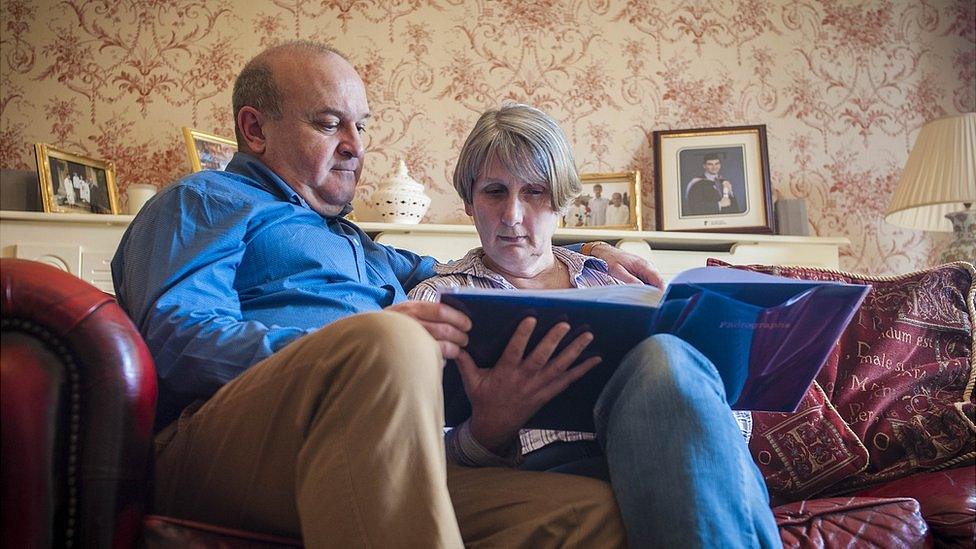
Ray and Alison Johnson look through a photo album of Elliott's time in Nottingham
Then at primary school he was invited to edit the school magazine and gained his own column "Know it all Elliott".
At Spalding Grammar School, Elliott's political leanings developed and he won a mock election with 80% of the votes for the Conservatives - a result that triggered letters of congratulations from both Baroness Warsi and Boris Johnson. His mother suggests bribery by chocolate may have played a part.
"He was a great debater," says Ray. "He always put his head above the parapet."
His passion for debate was noted by his Latin teacher, who imposed a two-question-per-class on Elliott.
Beyond politics he swam, ran and played rugby despite suffering from mild asthma.
"Everything was a personal crusade with Elliott. If he was going to do something, it had to be done properly," says Ray.
After moving to London and getting a job as a political editor with Conservative Way Forward in June 2015 Elliott was, says Ray, exactly where he wanted to be.
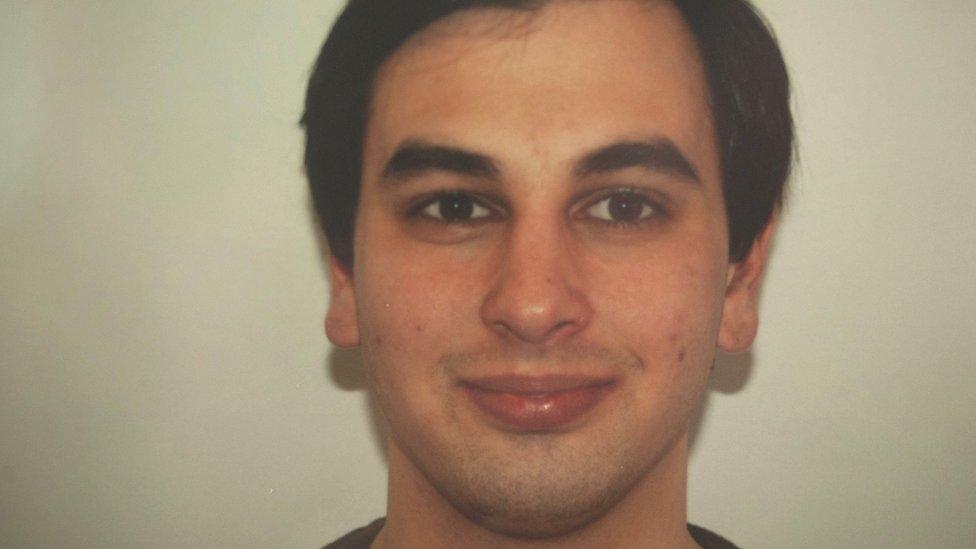
Elliott Johnson's parents hope his inquest verdict will allude to the reasons why he took his own life
But then it all seemed to fall apart.
"It was quite clear from his (suicide) note that there were a number of issues in his life," says Ray. "He didn't tell us, he kept it very much to himself.
"I suppose he's no different to many other young men. They experience good times and bad times, but they don't tell the people they should tell."
"Reading those final words, it torments you really.
"Quite clearly he loved us, he said so several times in his letter. He said that we were 'awesome', which was a term he had never used for us beforehand."
"The inquest is the start, the very start, of the process," says Ray.
- Published4 March 2016
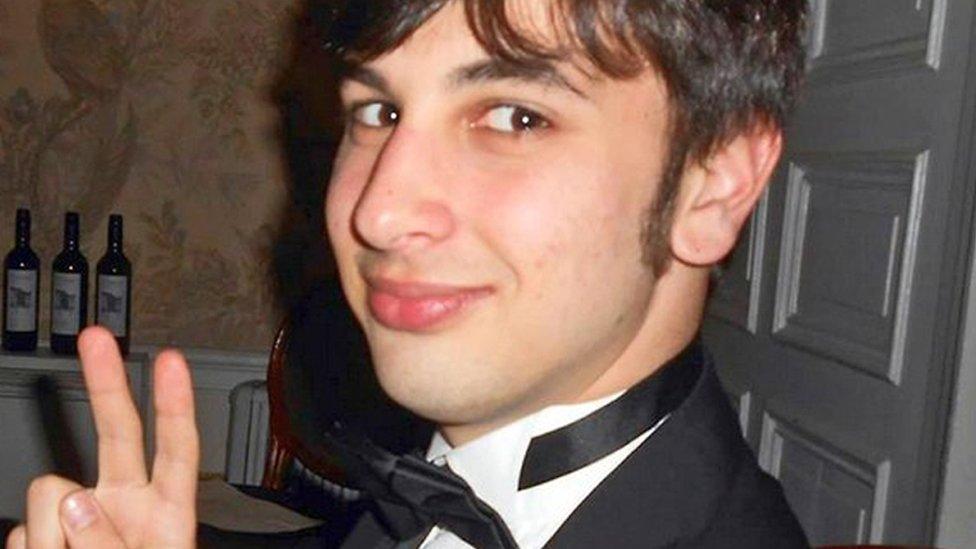
- Published2 March 2016
